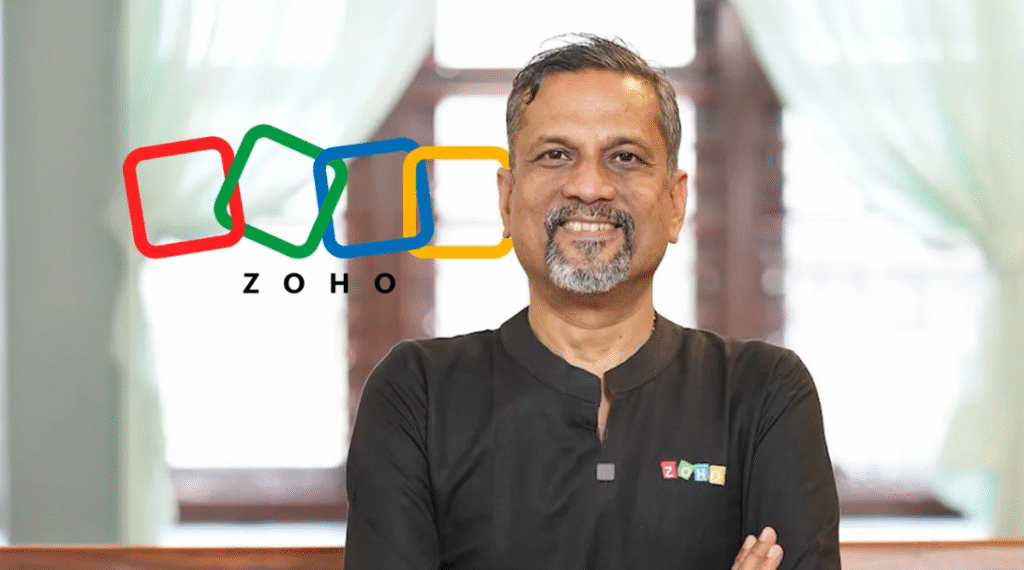Zoho is no sideline project: it’s become a serious contender in the enterprise software world. And for me, watching it grow feels like watching something deeply Indian rise with quiet strength. Let’s walk through how Zoho got here—and why it means more than just business wins.

Who Is Sridhar Vembu — and What Made Zoho Happen
If Zoho had a soul, Sridhar Vembu is its heartbeat. He’s not a flashy founder you see on every Netflix docuseries—he’s quieter, more deliberate. But his convictions run deep. After working in Silicon Valley, he chose a different path: build something sustainable, from the ground up, and own it on your terms.
He started AdventNet, a software company, and gradually evolved it into Zoho—refocusing on SaaS tools that solved real enterprise problems. What’s distinct about Vembu is his reluctance to bow to external pressures: he wanted control, integrity, and a chance to build tech that India (and the world) could call its own. No chasing glory, no selling out early.
That mission—local value, global standard—is baked into Zoho’s DNA.
Why Arattai’s Moment is Bigger than It Looks
You know how sometimes something tiny rips open a bigger conversation? That’s what happened with Arattai, Zoho’s messaging app. It didn’t become viral because it was perfect; it became viral because someone asked a very human question: What if my private messages get exposed? And Sridhar’s unfiltered, direct response perhaps struck a chord.
In that moment people realized: this isn’t just software. There’s a face behind it. Someone who’ll stand by privacy, who’ll respond with actual words (not PR talk). That human connection gave Arattai cultural resonance. It showed people that an Indian product doesn’t have to trail in trust or esteem.
Even if Arattai doesn’t become the next WhatsApp, its ripple effect is real: a native app, built by Indians, getting people to reconsider what “trustworthy tech” can look like.
Zoho vs Odoo: Different Tools, Different Visions
If Zoho and Odoo were two musicians, they’d be playing in different genres—and sometimes you pick one depending on your taste.
- Zoho is polished. It’s designed to just work. You get CRM, collaboration, finance—all in one suite. Integration isn’t an afterthought. The promise is: you don’t have to worry about stitching pieces together.
- Odoo is more open, modular, customizable. If your business has unique workflows, or you don’t mind tinkering, Odoo gives you freedom. But with freedom comes responsibility—you may need extra effort, and talent, to shape it.
If you’re a company that wants something reliable, fast to adopt, minimal friction, and Bharatiya or Indian-made—Zoho often wins, isn’t it?
The real point is: Zoho’s growth is meaningful because it appeals to those who want power, comfort, affordable and trustable solutions homegrown in India!
Taking Zoho to APAC and the Middle East: A Quiet Expansion
Zoho didn’t burst onto those international stages with fanfare. It expanded methodically—hiring regional teams, building partnerships, adapting to local realities. In the Middle East especially, it tied into payments, local compliance, and made itself relevant for small and medium businesses that were desperately underserved.
In APAC too, where there’s a massive base of SMEs, Zoho’s pricing, bundled features, and ease-of-use put it in the “smart default” category. It’s not always the flashiest option, but it’s solid, trustworthy, and efficient.
In markets where cost, trust, and locality matter, Zoho’s profile fits. That’s not luck—that’s positioning.
Inside Zoho: Culture, Values, Quiet Power
What happens behind the scenes is often more telling than revenue numbers. Zoho doesn’t follow the “spray money, attract talent” playbook so common in Silicon Valley. It bets on something else: rootedness, ownership, and craft.
They built rural campuses in India. They’ve pushed remote work long before it became a buzzword. They’ve encouraged engineers to work from hometowns. The idea: talent doesn’t need to be in a glass tower. And when people stay in a region they belong to, their work connects with lived reality.
What comes out of that:
- Deep retention. People who stay longer understand the product in its bones.
- Strong institutional memory. You’re not constantly rebuilding.
- A sense of purpose beyond just “make revenue.”
Yes, there are debates: Is the leadership too paternal? Do certain decisions reflect a narrow worldview? Probably. No culture is perfect. But Zoho’s choices show they are trying something different—not aping Silicon Valley, but creating something of their own.
What Zoho Means for Bharatiya Culture in Tech
This is the part that makes me feel proud. Zoho’s rise isn’t just an enterprise SaaS story. It’s an Indian narrative. It says: we can build serious, global software with Indian values. We don’t have to bow to foreign capital, to legacy norms, or to copying.
Three threads ripple outward:
- Confidence in Indian creation. When Zoho builds a world-class CRM, it pushes back against the idea that “Western = better tech.” It models that we can invent, not just consume.
- Tech rooted in local soil. By growing from Indian campuses, with rural touchpoints, Zoho injects geography and community into tech—something too many companies overlook as they scale.
- Sovereignty & trust as strengths. When Zoho talks about privacy, local data infrastructure, decision-making control, it’s promoting a worldview: data is not just a commodity. That is a Bharatiya idea, deeply resonant.
Zoho’s influence means that when a company abroad uses Zoho, it’s also adopting pieces of its ethos. Little by little, that spreads a different idea of what Indian technology looks like: stern yet humane, autonomous yet globally capable.
Strategy, Destiny—or Both?
If I were to bet, Zoho’s rise is not destiny. It’s strategy—layered, persistent, values-driven—with a few serendipitous moments that accelerated the climb. But hey, serendipity gets unlocked when one works towards it isn’t it?
Zoho planned for control, from funding to architecture. It cast dust lines (regional expansion) long before it needed them. But it also had moments—like Arattai’s virality or shifts in data policy—where external forces magnified what they’d already built.
Destiny might be romantic, but the real story here is steady craft, doing the slow work, trusting long arcs, and showing that an Indian software company can compete — not by mimicry, but by difference.
Here’s your route to Zoho’s World: www.zoho.com – said it rightly:
Your life’s work powered by our life’s work!
Sources:
NDTV — “Trust Me, Bro”: Zoho Founder Responds To Arattai Privacy … www.ndtv.com
Times of India — Zoho founder Sridhar Vembu comments and profile pieces. The Times of India+1
India Today — Arattai usage and encryption plans. India Today
Zoho Official Blog — trends and opportunities in the Middle East; remote work culture. Zoho+1
People Matters / ME coverage — Zoho partnership news in the Middle East. me.peoplemattersglobal.com
Innowise / industry write-ups — comparative analysis: Zoho vs Odoo. Innowise+1
CNBC-TV18 interviews with Sridhar Vembu — founder’s perspective on building in rural India. YouTube





